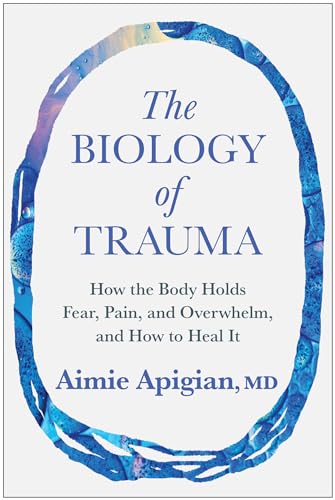
The Biology of Trauma
by Aimie Apigian
ISBN-13: 9781637746233
Hardcover: 320 pages
Publisher: BenBella Books
Released: September 23, 2025
Source: ebook review copy from the publisher through NetGalley.
Book Description, Modified from Goodreads:
The latest research on how trauma impacts our bodies on a cellular level. Traditional medicine still mistakes subtle signs of trauma for stress, anxiety, or chronic disease—sometimes even retraumatizing patients with outdated and misguided methods. Treatment plans that focus on the mind are only addressing the downstream effects. Likewise, common medical approaches to manage symptoms fail to explore root causes and promote genuine recovery.
If we want to truly heal, we need to understand trauma as something happening inside of the body—not as a singular external event. Gaining clarity on how our bodies hold onto experiences, impacting both our physical health and our ability to maintain healthy behaviors and relationships, is crucial. That’s where Dr. Aimie Apigian’s integrative, revolutionary approach comes in.
With a decade of clinical research, approachable storytelling, and real-life examples, The Biology of Trauma will show ways to identify commonly overlooked trauma symptoms like lethargy, fogginess, and unexplained worry and to recognize how emotional pain stored in the body affects overall health on a cellular level, even for people with functionally successful lives. This information can help prevent trauma-induced changes in your biology that suppress the cycle of recovery. Lern to work with your nervous system to safely heal—without risk of retraumatization.
Perfect for both individuals seeking personal growth and health professionals improving their practice, The Biology of Trauma will help you gain deep insights into your own mind, body, and healing journey.
My Review:
The Biology of Trauma explains how trauma impacts our bodies in a very specific sequence of steps designed to protect us long term. The first half of the book explained these steps in detail, how to recognize where you are in the sequence, and what to do so you don't get stuck in a trauma response. The author went into enough depth in the science (explaining how the body reacts down to a cellular level) for professionals but used analogies and clear examples to help non-medical readers understand the material. I found this information very useful because I can now recognize when I'm hitting the Overwhelm part of the sequence and can change things (also explained in the book) so I don't go into a trauma response, or at least don't linger there. She pulled information together that I've heard before and tied it together in a way that made a lot of sense. I'd recommend this book just for this section.
I was disappointed in the second half, in which the author took some of the cases that she'd used as examples and described how she treated them to help them recover. Unfortunately, her approach is individualized and you basically have to sign up for her courses. For example, she said that these clients went through a series of somatic exercises/movements that are foundational to recovery but didn't describe them beyond a few examples, like one woman needed to do hands-and-knees crawling for weeks. While this section gave an idea of things to check out (nutrition deficiencies, etc.) and what sort of things are done in the author's program, it's not something you're equipped to do on your own by the end of the book.
If you've read this book, what do you think about it? I'd be honored if you wrote your own opinion of the book in the comments.



